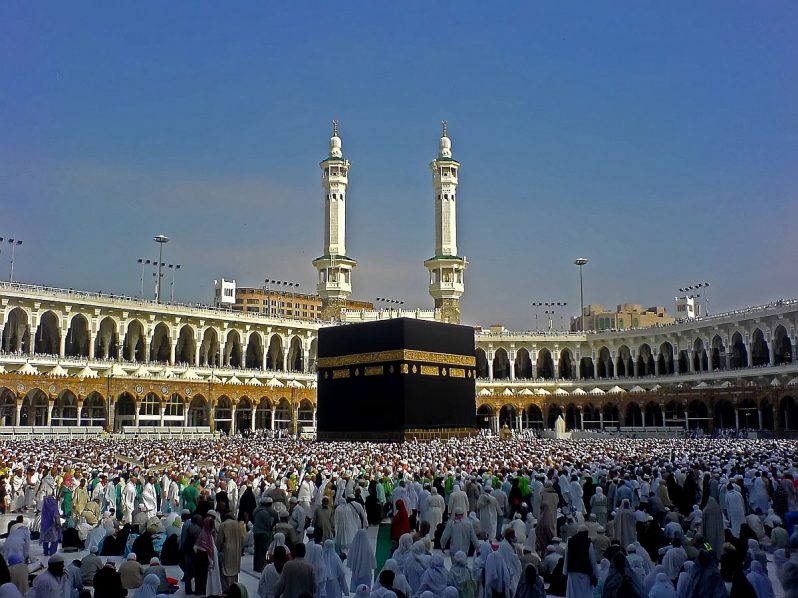EID-UL-ADHA, the great sacrifice is commemorated on the 10th of Zil Hajj, the last month of the Islamic Year, following the completion of Hajj (pilgrimage to Mecca) when an animal is sacrificed (Qurbani) in memory of Prophet Ibrahim and his son Ismaeel’s great act of faith many centuries ago.
Prophet Ibraheem said to Ismaeel “O my dear son! I saw in a dream that I was offering you in sacrifice; consider therefore what your opinion about it is!” And Ismaeel answered: “O my Father! Do what you have been commanded to do, you will find me, if Allah so wills, one practicing patience and constancy!”
When they both surrendered themselves to Allah’s will and Prophet Ibrahim had laid down his son, he directed his knife to Ismaeel’s throat with strength to make it cut but the knife made no entrance. He was extremely troubled, then came a voice from heaven which called out to him saying: “O Ibrahim, you have indeed fulfilled the dream thus we do reward the righteous! So we ransom him with a great and noble victim”. A large lamb with horns and red wool was presented to be sacrificed instead of Isameel. Of course this was a manifest trial for Ibrahim and his son. It is reported in the Holy Quran that the flesh and the blood reach not Allah but the devotion from you reacheth Him.
Prophet Ibrahim’s trust in Allah and willingness to submit to Him with the sacrifice of his dearest possession was a severe trial turned manifest example. It is readily evident that when Ibrahim was willing to fulfill Allah’s command of giving up his dear son, Allah did not really want his son since he was given to Ibrahim in his old age. It was a test and both Father and Son submitted to the Will of Allah.
Muslims around the world observe this occasion of commitment, obedience and self-sacrifice to Allah in a traditional manner. On this day Muslims make an early start by wearing their best clothing and attend the congregational prayers of Salatul-Eid (Eid Prayer) in the morning. This congregational prayer is usually preformed in an open space where Muslims use the occasion to pray to Allah and to glorify His name to demonstrate the remembrance of His grace and favours. Muslims also remember the deceased by praying for their souls. This is followed by a short sermon, after which Muslims who can afford to do so offer domestic animals, usually sheep, as a symbol of Ibrahim’s sacrifice. In Guyana it is customary to offer the sacrifice in the compound of the Mosque as the facilities are spacious and more convenient.
It is highly recommended to divide the Qurbani meat into three portions; one should be kept for the family, one for the relatives and one for the needy and poor. It is forbidden under Islamic law to sell the meat. No helper should be given the meat or skin as a form of payment. Instead a separate remuneration should be given.
Notwithstanding the symbolism of the occasion, Eid-ul-Adha is a reminder for Muslims to reflect on how Prophet Ibrahim was ready to sacrifice each blessing and happiness of his life for the sake of Allah without giving a second thought to his own will. We should all try to reflect on the significance of this event. The Muslim who diligently adheres to his duties of this day will be the one to maximize his spiritual gains. He would have gained a strong command over his desires and have the ability to exercise self-control. Once a person acquires these qualities he now has the ability to control himself and discipline his passion. In attaining this level of spirituality, he can be free from acts of wrong doing, jealousy, greed, humiliation and other similar worldly temptations.
Today marks a day of victory for the Muslim as Eid-ul-Adha transcends all limits and expands over the dimensions of human life. The one who succeeds in securing his spiritual rights and growth will be victorious in spirit. The one who observes his duties diligently will be triumphant in faith. He has indeed achieved his greatest victory.
On behalf of the Board of Trustees and Members of the East Georgetown Sunnatul Jamaat, I extend a blessed Eid-ul-Adha to the Muslim Community. May Allah accept our sacrifice.



.jpg)








